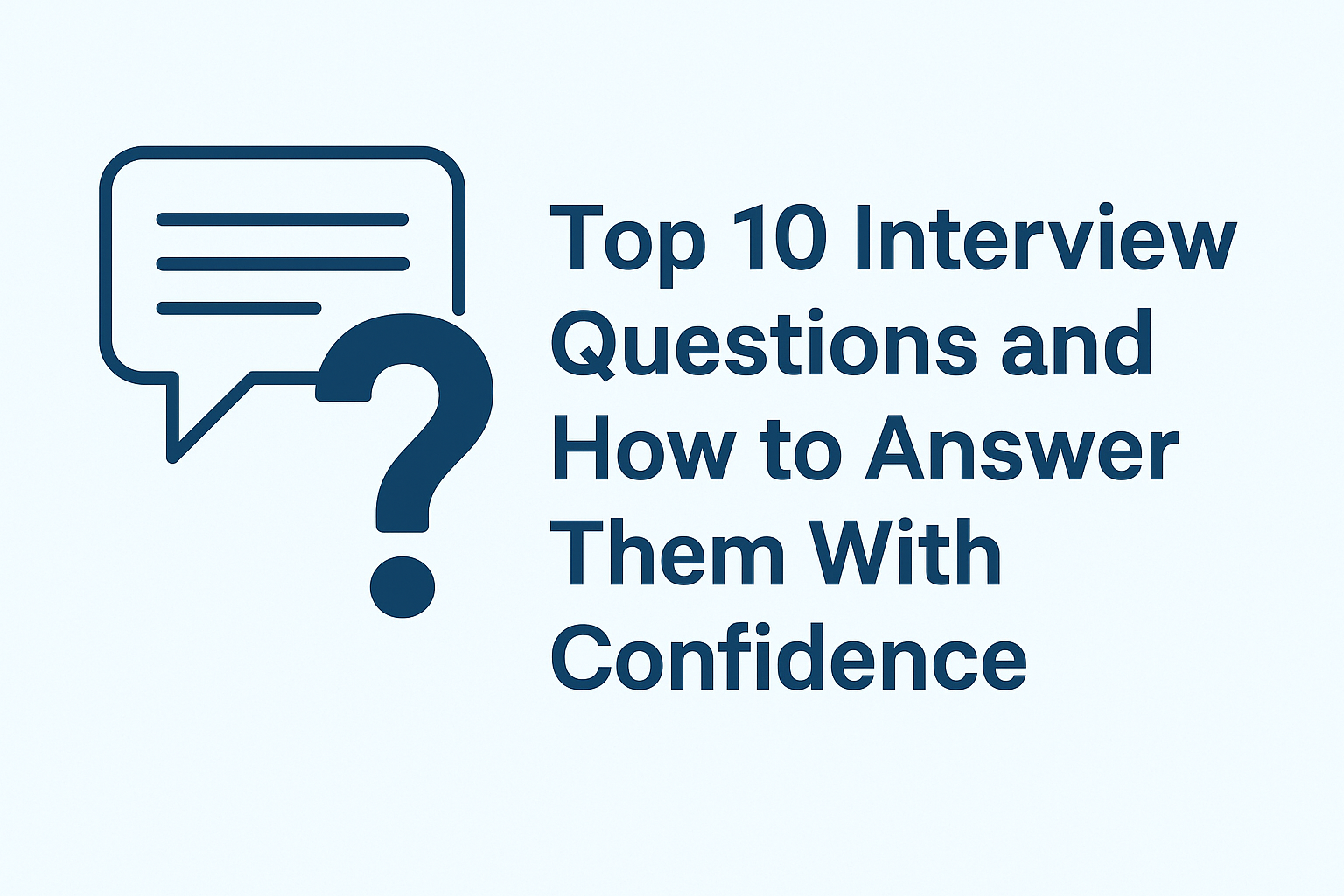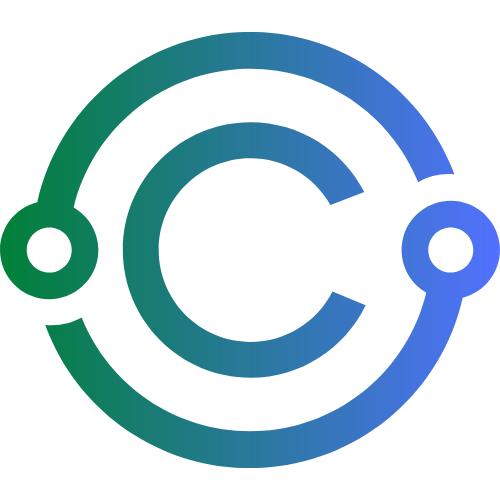Top 10 Interview Questions and How to Answer Them With Confidence

You’ve polished your resume, written a killer cover letter, and landed the interview. Now comes the part that makes most job seekers sweat: the actual interview.
Whether you're a recent graduate or a seasoned professional, job interviews can be nerve-wracking. But the good news? Most interviewers ask the same core set of questions. With the right preparation, you can answer them with confidence and clarity.
In this blog, we’ll cover the top 10 most common interview questions, break down why they’re being asked, and show you how to craft standout answers. We’ll also share a real-life case study and point you to helpful tools and resources.
1. Tell Me About Yourself
Why they ask it: To see how you present your background and whether you can connect it to the job.
How to answer: Use a present-past-future structure.
Example:
“I’m currently a marketing coordinator at ABC Corp, where I’ve led social campaigns that increased engagement by 60%. Previously, I completed a degree in digital media. I’m now looking to grow into a more strategic role like the one you’re hiring for.”
Tip: Keep it under 2 minutes. Practice your “elevator pitch.”
2. Why Do You Want to Work Here?
Why they ask it: To gauge your interest and whether you’ve researched the company.
How to answer: Mention something specific: mission, product, culture, or recent news.
Example:
“I admire your commitment to sustainability and was impressed by your recent eco-packaging initiative. I’d love to bring my operations background to a company that shares my values.”
Resources:
3. What Are Your Strengths?
Why they ask it: To see what you’re proud of and how it aligns with the job.
How to answer: Pick 2–3 strengths with examples.
Example:
“One strength is problem-solving—I recently built a dashboard that cut report time by 40%. I’m also a strong communicator, which helps me present complex data clearly to stakeholders.”
Avoid generic lists. Be specific.
4. What Are Your Weaknesses?
Why they ask it: To see your self-awareness and growth mindset.
How to answer: Pick a real weakness you’ve taken steps to improve.
Example:
“I used to be hesitant about public speaking. So, I enrolled in a Toastmasters group and now present at our monthly team meetings.”
Don’t say: “I’m a perfectionist” or “I work too hard.”
5. Describe a Challenge You Faced and How You Overcame It
Why they ask it: To evaluate your problem-solving and resilience.
How to answer: Use the STAR method (Situation, Task, Action, Result).
Example:
“We had a client upset about a delayed delivery (S). I was tasked with restoring the relationship (T). I offered a revised timeline, regular updates, and a discount (A). They renewed for another year (R).”
Tool: STAR Interview Framework
6. Why Are You Leaving Your Current Job?
Why they ask it: To understand your motivation and ensure you're not running from problems.
How to answer: Be honest but positive.
Example:
“I’ve learned a lot at my current job, but I’m looking for new challenges and a company that offers clearer growth paths.”
Avoid: Bashing your employer, manager, or coworkers.
7. Where Do You See Yourself in 5 Years?
Why they ask it: To assess your ambition and whether the company can meet your goals.
How to answer: Align your growth with what the company can offer.
Example:
“In five years, I hope to lead my own product team and contribute to innovations that improve customer experience—ideally at a company like yours that values internal leadership development.”
8. Tell Me About a Time You Worked in a Team
Why they ask it: To assess collaboration, communication, and team fit.
How to answer: Highlight your role, the outcome, and your contribution.
Example:
“While launching a new feature, I worked closely with developers, marketers, and designers. I coordinated the timeline and led our standups. The release went live early and exceeded adoption targets.”
9. How Do You Handle Pressure or Tight Deadlines?
Why they ask it: To assess how you stay composed and productive.
How to answer: Share a high-pressure example and how you managed it.
Example:
“During peak season, we had three projects due within a week. I prioritized tasks, delegated to teammates, and used daily check-ins. We met every deadline with no quality drop.”
Tools to reference: Trello, Asana, Google Calendar, Notion
10. Do You Have Any Questions for Us?
Why they ask it: To evaluate your engagement and curiosity.
How to answer: Always say yes. Ask 2–3 questions.
Examples:
- What are the biggest challenges someone in this role would face?
- How is success measured for this position?
- Can you tell me more about the team I’ll be working with?
Avoid salary/benefits unless prompted or it’s a second/third round.
Bonus Tips for Interview Confidence
- Practice aloud. Use Pramp or record yourself.
- Prepare anecdotes. Create a “success bank” of STAR stories.
- Dress for the role. Even in virtual interviews.
- Arrive early. Or log in early and test tech.
- Follow up. Send a thank-you email within 24 hours.
Case Study: How Amina Nailed Her Interview by Rehearsing the Top 10
Amina, a recent MBA graduate in the UAE, had applied to over 25 analyst roles and landed three interviews—but froze on the spot when asked, “Tell me about yourself.”
Determined to improve, she:
- Practiced answers to the top 10 questions
- Rewrote them using the STAR method
- Recorded herself and got feedback from a mentor
- Tailored her stories to each company she applied to
In her next interview, she confidently answered every question and asked thoughtful follow-ups.
Result: She was offered a position at a leading consultancy firm in Dubai.
Takeaway: Familiarity breeds confidence. The more you rehearse, the more natural you’ll sound.
Helpful Tools & Resources
- Interview Warmup by Google
- Big Interview
- Glassdoor Interview Reviews
- Teal Job Tracker
- Notion Interview Prep Template
Job interviews can be daunting—but they’re also predictable. By preparing for the most common questions, you take control of the conversation.
Remember:
- Be authentic, not scripted
- Back up your answers with results
- Tailor everything to the role
A strong interview is your chance to prove you're not just a fit—you’re the best choice.
More from UJ+:
- The STAR Method: Ace Every Behavioral Interview Question
- How to Write a Resume That Gets Noticed in 6 Seconds
Subscribe to UJ+ for weekly career tips, interview strategies, and real success stories.

